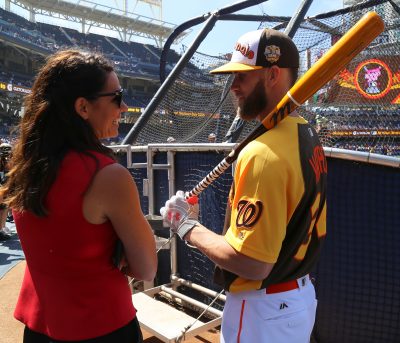
“Don’t look at the comments.”
Those are the words heard by female commentators and media members once they hit the spotlight. Once a woman makes it in the industry, looking at the comments section of articles, Twitter responses or even emails could prove to be more than just a distraction.
That must be what Jessica Mendoza hears consistently as her first full season as a “Sunday Night Baseball” commentator comes to an end. Mendoza, the first full-time female baseball commentator on national television, debuted last season to rave reviews.
Mendoza replaced Curt Schilling, who was fired by ESPN late last season amid social media outbursts, as the third person in the booth with Dan Shulman and Aaron Boone. Boone is the only broadcaster in the booth to have played Major League Baseball. If that’s a qualifier to be a baseball commentator, Shulman hasn’t heard those complaints.
Mendoza has, despite being an Olympic medal-winning softball player.
What separates Mendoza from Shulman in terms of qualifications? Some say it’s the differences between the roles of play-by-play and commentary. If that’s the case, though, Tom Verducci never played pro baseball and is a popular commentator.
In fact, several local radio color commentators never played the game professionally, including Red Sox radio commentator Tim Neverett, who has received positive reviews in his first season in Boston.
Could it be that Mendoza is a female voice, or a woman interfering in a “man’s space?”
That’s another side of the argument, yet baseball is one of the progressive sports; it has two female commentators in Mendoza and Yankees radio color analyst Suzyn Waldman.
It’s no surprise there are less female commentators than men in sports, but the disparity is disheartening. This doesn’t include sideline reporters, who don’t give real-time analysis of the sport. There are plenty of excellent sideline reporters, male and female, but it is a role females have traditionally been pigeonholed into. For years they’ve been discouraged from venturing into commentary roles.
The NFL does not have a single woman as a regular in the broadcast booth, with Kate Scott becoming the first to ever call play-by-play in a pair of preseason games. The NHL, on the other hand, does not have a single woman play-by-play or color analyst, besides Sherry Ross’ one game gig in 2009. The NBA has Doris Burke on ESPN, and last season Stephanie Ready and Ann Myers became the first female duo to call an NBA game.
A 2013 report found that the NFL was the worst of the major four sports leagues in gender diversity hiring practices, and the NBA was far and away the best. The NBA is the only league to have a regular season woman play-by-play commentator in Burke, but a quick Twitter search will net complaints of women talking about sports.
If the biggest complaint as a broadcaster you receive is your existence — which is the most disturbing aspect of female broadcasters for some viewers — you’re doing something right. At least people are talking, which is a start.
The argument of not having played the game has been debunked. It’s one thing to criticize an analyst’s work, but it’s an entirely different one to give comments, threats, and attacks that men do not face in the booth.
Brooks Marlow, a Houston Astros minor leaguer and a career .233 hitter, tweeted this earlier in October during a Mendoza broadcast: “No lady needs to be on espn talking during a baseball game specially Mendoza sorry.” He might want to review his own accomplishments before taking down an Olympic star.
Marisa Ingemi covers field hockey for the Daily Free Press. She is also a sports radio host on WTBU and involved in BU Athletics social media department. An avid sports fan, Marisa is also the manager of the acclaimed lacrosse website InLacrosseWeTrust.com and the Boston Bruins beat writer for InsideHockey.com.


Here’s one comment you can confidently read — you’re 100% correct. The notion of on-field game play experience being a necessary requirement for broadcasting is so often an attempt to bar women from having a voice (particularly, as you point out, because it is so rarely complained about for men). One’s broadcasting skills should always determine their candidacy, and yet, quite often the most high-profile former stars leave much to be desired in this area. Truly, it’s so sad that so many fixate on who is speaking rather than what is being said.